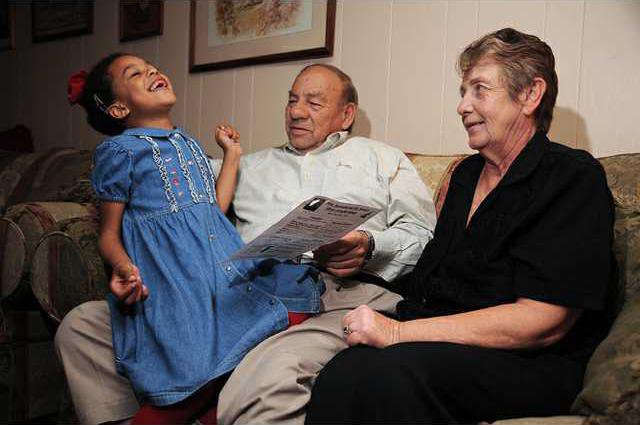Six years ago, Al and Karen Hollander found themselves in familiar, but unexpected territory. They had raised their own family and were settling comfortably into their roles as grandparents when they found themselves adjusting to a second round of parenting. Although their children were adults, the Gainesville couple found themselves stepping into the role of legal guardians for a 6-month-old little girl, Terri Jordan. When they took her in, they braced themselves for sleepless nights, teething and potty training. What caught them off guard was their inability to find insurance coverage for Terri after they adopted her. "Some friends of ours knew of her mother. Due to health problems, she was unable to take care of Terri. She was very near to being put into the system when we talked to her caseworker about taking care of her," said 68-year-old Karen Hollander. "We agreed that we would take care of her until her mother was able to." Yet her mother’s situation never improved. To date, the Hollanders are the only family Terri has ever known. Seeing that Terri’s mother wasn’t getting any better, and fearing that she would become a ward of the state if anything happened to the couple, they officially adopted her in January. "When she was just under our guardianship, she was still considered a ward of the state, so she was eligible for Medicaid," Hollander said. "We knew once we adopted her, she wouldn’t be eligible for Medicaid because our income wouldn’t allow it. But we didn’t know she wouldn’t be able to be insured through a private company." Although their modest retirement income doesn’t make them rich, Hollander says it is still over the income threshold for Medicaid coverage for Terri. Since they’re ineligible for public coverage, the couple tried obtaining a family policy through a private insurance company. "Because we’re both of Medicare-age, private companies won’t insure us," Hollander said. After hitting a dead-end with that, the couple tried getting a separate policy just to cover Terri. That hasn’t worked, either. "The pre-existing law went into effect in September. That law says that children with pre-existing conditions can no longer be denied health care coverage," Hollander said. The U.S. Department of Health and Human Services confirms what Hollander has discovered. The pre-existing law only protects children with existing health issues from insurance discrimination. Since Terri doesn’t have any pre-existing conditions, by default she’s outside of the new law’s protection. Although the federal Affordable Care Act prevents pre-existing condition discrimination against children, the law won’t provide the same benefits to adults until 2014, leaving the Hollanders out in the cold. Sniffles and minor injuries may be a part of growing up, but if they turn into larger problems, the Hollanders say they may be in big trouble. "God forbid she gets some type of catastrophic condition. My grandson was diagnosed with cancer three years ago. Thankfully he’s in remission now, but my son is paying $1,500 for health (expenses)," Hollander said. "That could wipe us out." The couple say they have exhausted all reasonable options. "We even asked her (former) caseworker if we could pay her (old public insurance) premiums so we could get coverage for Terri that way. We were told no because there weren’t any provisions for that," Hollander said. "Someone suggested that if my husband and I got a divorce and we just used my income, Terri would be eligible for Medicare that way. We’ve been married for 52 years. Divorce isn’t an option." Even though they don’t know of any other senior couple experiencing the same problem, it’s safe to assume that theirs isn’t an isolated case. According to the U.S. Census Bureau, around 8 percent of children are being raised by their grandparents. In Hall County alone, more than 40 percent of grandparents are raising their grandchildren. Hollander has made appeals to the Georgia insurance commissioner and even the White House, but nothing seems to make a difference, she says. Attempts by The Times to reach the commissioner’s office were unsuccessful. "I think this is just horrendous how something like this was allowed to fall through the cracks. No one even seems to know about this loophole, either," Hollander said. "When I called the insurance commissioner’s office, they had to do some research and call me back. They told me that unfortunately, it’s true. They can’t force people to insure someone. "Someone said blame (President Barack) Obama, but I don’t blame him. I blame insurance companies." Although they didn’t foresee these problems before adopting Terri, the couple says they don’t regret their decision. "We love her dearly. She’s very bright, outgoing and active," Hollander said. "If something happened to us, we hated to see her become a ward of the state. "Somewhere there has to be some kind of correction for this, but we don’t know what it is. We’re just regular people and no one seems to give a darn."
A case for Terri
Health care coverage loophole leaves Gainesville couples child uninsured

